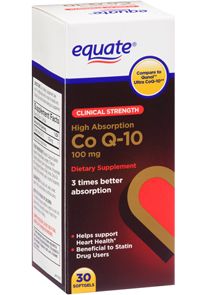Top Class Actions’s website and social media posts use affiliate links. If you make a purchase using such links, we may receive a commission, but it will not result in any additional charges to you. Please review our Affiliate Link Disclosure for more information.

U.S. District Judge Cynthia Bashant kept most of the charges against Wal-Mart over its Equate CoQ10, or coenzyme Q10, saying that the fraud allegations were sufficiently pled, she said in her Jan. 20 ruling.
Even though plaintiff Thamar Cortina does not claim that she suffered a physical injury from the Equate CoQ10, she did suffer an alleged economic injury when she purchased the product that included misleading, exaggerated statements, Judge Bashant explained, and therefore, she has standing to bring this class action lawsuit.
“In its motion to dismiss, [Wal-Mart] challenges plaintiff’s standing because plaintiff could not allege an injury without alleging she consumed the Equate supplement that she bought in reliance on the claims made on its packaging,” the California federal judge wrote.
“However, the sale itself caused an economic injury-in-fact, and therefore this court has standing to adjudicate the controversy,” she added.
According to Judge Bashant, the Wal-Mart CoQ10 class action lawsuit does provide enough facts about the purchase and facts that support the fraud claims.
“Plaintiffs must plead enough facts to give defendants notice of the time, place, and nature of the alleged fraud together with an explanation of the statement and why it was false or misleading,” the federal judge wrote.
“In this case, plaintiff’s purchase and injury-in-fact establish many of the prerequisites for both standing and Rule 9(b) — the ‘who, what, when, where, and how of the misconduct,” Judge Bashant continued.
“The [first amended complaint] gives a reasonably specific recitation of the facts of the purchase and includes facts supporting fraud allegations,” she added.
However, Judge Bashant did dismiss the alleged violation of the Arkansas Deceptive Trade Practices Act with prejudice, because that is not the state in which the plaintiff claims she purchased the Equate CoQ10, even if that is where Wal-Mart’s headquarters are located.
“Plaintiffs injuries occurred in California, and California’s interest in protecting customers in this state outweighs Arkansas’ interests,” the California federal judge stated.
“At this point, plaintiff cannot possibly allege any facts consistent with the First Amended Complaint that could give rise to a cause of action under Arkansas law for plaintiffs who did not purchase Equate in Arkansas,” she added.
Wal-Mart had argued in its motion to dismiss that Cortina’s argument in the Wal-Mart class action lawsuit from the U.S. Pharmacopeial Convention shouldn’t apply when making a case for breaches of warranty because Wal-Mart isn’t required to adhere to its standards.
However, Judge Bashant said that the stands set forth by the agency could be useful later on during the course of the CoQ10 class action lawsuit.
“Accepting this as true, evidence that Equate is produced in ‘inconsistent batches’ shows that the product compares unfavorably to itself,” the judge argued.
“USP testing may be relevant for some purposes at trial and may provide evidence supporting the breach of the implied or explicit warranties made by defendant,” she concluded.
“Further, the invited comparison to Qunol — the packaging’s exhortation to ‘Compare to Qunol’ — may avail Equate to comparison to the USP monograph because Qunol meets the USP standards,” she added.
Judge Bashant also kept the allegations brought by the nationwide class, the claims under the Magnuson Moss Warranty Act, and the claims under the California Legal Remedies Act.
CoQ10 is an antioxidant that is naturally produced by the heart, which decreases as a person ages, develops heart disease or as the result of some medications, the Wal-Mart Coq10 class action lawsuit explained.
Cortina alleged that Wal-Mart had engaged in false advertising of its Equate CoQ10, saying that the soft gels do not rupture in time for the supplement to be absorbed by the body, making the claims on the product’s packaging false.
Cortina wants to represent a nationwide class and a California class of Equate CoQ10 purchasers.
The Wal-Mart CoQ10 class action lawsuit was dismissed without prejudice in June 2014, giving Cortina permission to file an amended complaint. This decision is based on that amended complaint.
The plaintiff is represented by Jack Fitzgerald of the Law Office of Jack Fitzgerald PC, andRonald A. Marron, Skye Resendes and Alexis M. Wood of the Law Offices of Ronald A. Marron APLC.
Wal-Mart is represented by David C. Allen, Kevin D. Rising, Sarah E. Johnston and Jade F. Jurdi of Barnes & Thornburg LLP.
The Wal-Mart Equate CoQ10 Class Action Lawsuit is Thamar Cortina v. Wal-Mart Inc., Case No. 3:13-cv-02054, in the U.S. District Court for the Southern District of California.
ATTORNEY ADVERTISING
Top Class Actions is a Proud Member of the American Bar Association
LEGAL INFORMATION IS NOT LEGAL ADVICE
Top Class Actions Legal Statement
©2008 – 2024 Top Class Actions® LLC
Various Trademarks held by their respective owners
This website is not intended for viewing or usage by European Union citizens.















3 thoughts onWal-Mart Equate CoQ10 Class Action Moves Forward
me too please add me to this
I just gt an envelope with 3 big containers of CoQ10 200mg 110 Softgels.. “Classaura Class action”..Anyone know anything about this??Thanks
Worthless